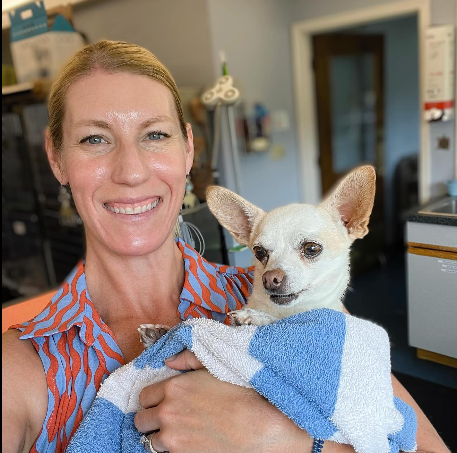It was just another lazy Saturday afternoon when I heard the crinkling of a snack bag coming from the other room. I didn’t think much of it at first, assuming my kids were getting into the chips. A minute later, however, I heard the chomping and crunching sounds continue, which struck me as odd since the kids had gone outside to play. I decided to investigate.
When I walked into the kitchen, I was shocked by what I discovered – my beloved labrador retriever Bella had somehow managed to get her paws on a freshly opened bag of Flamin’ Hot Cheetos and was going to town. The red powder covered her face and paws as she happily munched away, oblivious to the harm she was doing.
In a panic, I quickly confiscated the bag while unsuccessfully trying to get Bella to stop eating. By the time I was able to intervene, she had already consumed at least a dozen of the spicy snacks. I knew this could spell trouble, as dogs should never eat Flamin’ Hot Cheetos or other overly spicy human foods.
What’s So Dangerous About Dogs Eating Hot Cheetos?
For us humans, foods like Flamin’ Hot Cheetos might cause some temporary discomfort or indigestion at worst. But for dogs, the effects of eating hot and spicy snacks tend to be much more severe. Here’s why:
Spiciness Overload
The extreme spiciness can wreak havoc on a dog’s digestive system, causing vomiting, diarrhea, abdominal pain, and other gastrointestinal issues. My poor Bella was likely experiencing sensory overload from those fiery hot flavors!
Artificial Ingredients
Cheetos and similar snacks are heavily processed and loaded with artificial flavors, colors, and preservatives – things dogs weren’t designed to consume. These added ingredients can be challenging for dogs to digest.
Risk of Dehydration or Pancreatitis
All that salt, fat, and spice found in Hot Cheetos needs to be diluted with plenty of water as it passes through the digestive system. Without adequate hydration, dogs run the risk of developing dehydration or even pancreatitis – a painfully inflamed pancreas.
Nutritional Deficiencies or Weight Gain
From a nutritional standpoint, snacks like Hot Cheetos offer little value for dogs. Eating these low quality, calorie-dense foods may promote obesity and lead to vitamin or mineral deficiencies when consumed in excess.
My Dog Gets Sick After Eating Hot Cheetos – Now What?
Within hours of inhaling those ill-fated Hot Cheetos, poor Bella began exhibiting signs of distress. She became extremely lethargic, refused dinner, and made several trips outside only to vomit or have painful, bloody diarrhea.
Seeing those symptoms after what had transpired earlier, I knew right away that Bella was likely suffering from gastroenteritis triggered by the Flamin’ Hot Cheetos. At that point, I had some big decisions to make on how to proceed in caring for my ailing pup.
Try Home Treatment First
For less severe cases like Bella’s, veterinarians often recommend starting with home treatment and monitoring symptoms closely. Some things I did for her included:
Withholding Food: Allow the GI system to rest by not giving any food or treats for 6-12 hours. Only small sips of water should be offered during this time.
Allow the GI system to rest by not giving any food or treats for 6-12 hours. Only small sips of water should be offered during this time. Switching to a Bland Diet: A bland diet like boiled chicken and white rice for 1-2 days helps calm inflammation. Gradually transition back to her regular dog food when symptoms improve.
A bland diet like boiled chicken and white rice for 1-2 days helps calm inflammation. Gradually transition back to her regular dog food when symptoms improve. Staying Hydrated: Making sure Bella drank plenty of water was crucial for flushing out toxins and preventing dehydration. I gave her an electrolyte replacement drink to replenish lost fluids and nutrients.
When to Go to the Emergency Vet
In more severe cases of Hot Cheetos-induced illness, immediate veterinary attention is imperative. Bring your dog in right away if they exhibit:
– Bloody diarrhea or black, tarry stool
– Repeated vomiting over several hours
– Signs of dehydration – dry mouth, weakness, excessive panting
– Difficulty breathing or pale gums
– Multiple accidents in the house
– Abdominal swelling or tenderness
– Lethargy, shaking, or disorientation
Treatment at the vet usually includes fluids and electrolyte therapy, anti-nausea medications, gut protectants, gastric binders, and other supportive care. With aggressive treatment, most dogs recover fully even after eating Snack.
Lessons Learned: Preventing Repeat Incidents
After a couple rocky days of recovery, my precious Bella was back to full health – lesson learned! While I was relieved she bounced back quickly, I sure didn’t want a repeat episode anytime soon. Here are some precautions I now take as a pet parent to keep my curious canine out of harm’s (or rather Hot Cheeto’s) way next time.
Pet-Proofing 101
I went through my entire home and made sure to keep all human food securely out of reach of Bella. That means no more leaving chip bags out on the coffee table! Anything potentially dangerous goes into high cabinets or containers where clever paws can’t get into.
Training “Leave It”
I’ve been working on positively reinforcing Bella’s “Leave It” command – where she walks away when I drop a treat on the floor. This teaches vital impulse control around tempting food items – like Flamin’ Hot goodness! We practice this skill daily using dog-safe treats so she knows not to touch human foods unless explicitly given to her.
Paying Attention to Triggers
I now supervise Bella closely whenever food is being prepared or eaten to prevent Jefferson-swiping sneak attacks. I also inspect the yard for stray candy wrappers, foods, etc before letting her out unattended now that I know she’ll happily indulge given the chance!
In Conclusion
My heart may have skipped a beat as I watched my dog scarf down stolen Hot Cheetos that fateful day – but I sure learned a lot! Don’t underestimate the toll overly spicy snacks can take on your pup’s stomach. Additionally, be proactive in pet-proofing your home, working on training, and always paying attention to avoid similar scary scenarios. Here’s to healthier, cheerio-eating dogs!

Dr. Allison Kramer is a seasoned veterinarian with a Master’s degree in Animal Behavior and over 10 years of experience specializing in canine health and behavior. Her expertise in positive reinforcement training and holistic care enhances the well-being of dogs and fosters strong pet-owner relationships. For expert advice and valuable insights, follow Dr. Kramer on Instagram @dr.allisonkramer.





